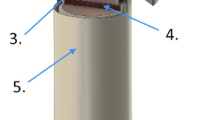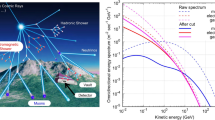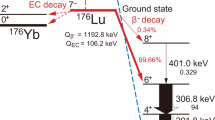Abstract
UNDER the above title Warburton, Fookes and Watt1 have described some measurements performed in June 1959 in Australia with a scintillation detector at altitudes up to 3.6 km. The day-to-day variations found by the authors “were surprisingly large and were found to occur mainly in the atmosphere between the ground and temperature inversion layers”. They concluded that it was probably mainly radon and its decay products which were detected and attributed their γ-counting to the γ-rays from lead-214 and bismuth-214, estimating that a record of 8 c/s corresponds to 10−17 c./cm3 of radon of a uniform concentration.
This is a preview of subscription content, access via your institution
Access options
Subscribe to this journal
Receive 51 print issues and online access
$199.00 per year
only $3.90 per issue
Buy this article
- Purchase on Springer Link
- Instant access to full article PDF
Prices may be subject to local taxes which are calculated during checkout
Similar content being viewed by others
References
Warburton, J. A., Fookes, R. A., and Watt, J. S., Nature, 207, 181 (1965).
Wigand, A., and Wenk, F., Ann. d. Phys. (4), 86, 657 (1928).
In Compendium of Meteorology, edit. by Malone, T. F., 155 (Boston, 1951).
Author information
Authors and Affiliations
Rights and permissions
About this article
Cite this article
BĚHOUNEK, F. Airborne Observations of Natural Radioactivity. Nature 209, 1342–1343 (1966). https://doi.org/10.1038/2091342b0
Issue Date:
DOI: https://doi.org/10.1038/2091342b0
Comments
By submitting a comment you agree to abide by our Terms and Community Guidelines. If you find something abusive or that does not comply with our terms or guidelines please flag it as inappropriate.



